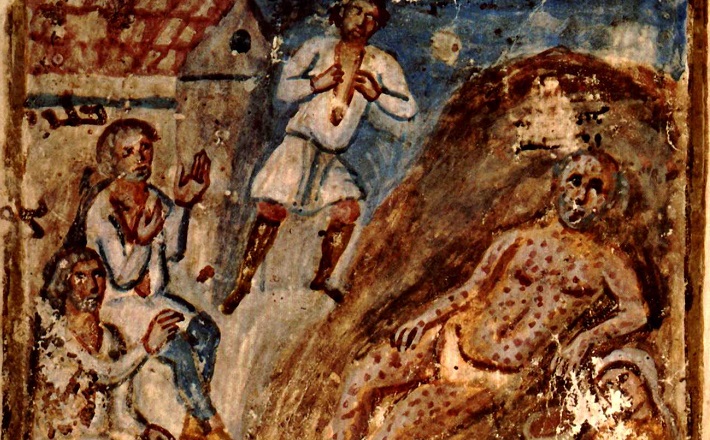Commentary on Job 41:1-8; 42:1-17
[This is the final week of a 5-week preaching series on Job.]
Week 5 (July 5, 2020)
Job 41:1-8; 42:1-17
Job responds to these speeches of God by recanting (a better translation in vs. 6 than “I despise myself”) and by acknowledging that he spoke of things he didn’t understand. The world is not a chaotic and disordered place, as Job had claimed (see ch. 9), and God is not vindictive and overly concerned with human sin, as he had argued (7:11-21). God’s concern for the world (including humanity) is far more expansive than Job had imagined. Humanity has a place in that world, but it is not what Job or his friends had imagined; that is, humanity as the center of creation and the sole recipient of God’s attention. God’s concern is for all of life and all of creation, including humanity. In the God-speeches, Job’s vision is expanded and Job’s hope is fulfilled: He has seen God (42:5; cf. 19:26-27).
Note: The preacher might put this text into conversation with texts like Matt 6:25-33 or Rom 8:31-39. These texts and many others affirm that God loves us and provides for us. The vision of Job emphasizes God’s love and care for all of creation, but it does not negate God’s love for humanity.
In closing verses of the book (Job 42:7-17), Job is commended by God for speaking “to me rightly” (42:7-8; a better translation than “of me what is right.”) Job, unlike his friends, has continued to speak to God rather than just about God and has thereby been faithful to that relationship.
Job’s fortunes are restored. He (and presumably Mrs. Job) have more children, and he gives his daughters names befitting their great beauty and an inheritance along with their brothers (an unheard-of act in that patriarchal culture). In other words, Job learns to govern his world the way God governs God’s world: with great delight in his children’s beauty and freedom. Like God, Job gives his children the freedom to be who they were created to be.
Though some readers find the epilogue of Job unsatisfactory, Ellen Davis suggests that the question one must ask is not, “How much (or how little) does it cost God to give more children?” but “What does it cost Job to become a father again?” (Getting Involved with God, p. 142). After all his suffering, Job does indeed choose to have more children; Job chooses to live again, even though he knows all too well the pain that living and loving entails. Such a choice stems from his fierce faith in the God of life.
At this end of the book of Job, it must be acknowledged that there is no fully satisfactory “answer” to the problem of innocent suffering. Still, Job provides us several faithful responses to suffering: speaking to God honestly and directly, and trusting that God will answer; risking living and loving even after great pain; and delighting in a world that is wild and beautiful and risky, trusting in the faithful God who created and still sustains that world.
Note: We read the book of Job as Christians, of course, and so we cannot finally speak of suffering without speaking of the cross. The preacher could speak of Job as a theologian of the cross (see Diane Jacobson’s article by that title in the Fall 2011 issue of Word and World ). The preacher could speak of the book of Job as a story of death and resurrection (though resurrection is not a full-fledged theological concept in the book of Job, the end of the book is a sort of resurrection). The preacher could also, of course, speak of Jesus’ suffering on the cross and his resurrection which holds the promise of new life for us all.
In other words, let the book of Job speak in its own right in your preaching (don’t “jump to Jesus” too soon), but don’t be afraid to read it through the lens of Christian faith, as well.
Blessings to you as you study and preach!


July 5, 2020